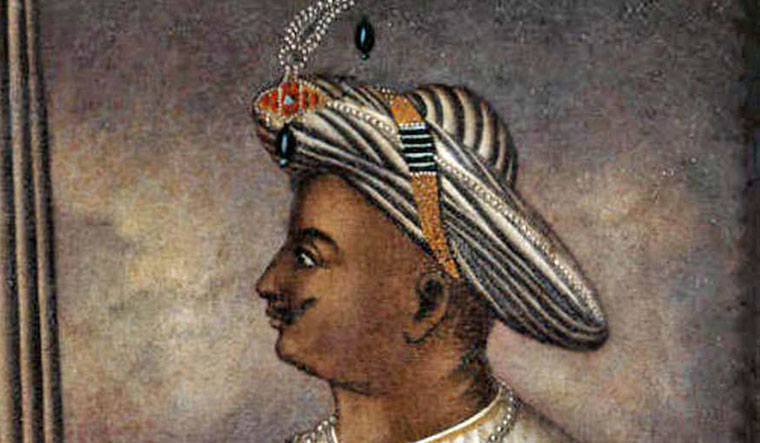Tipu Sultan died in the Battle of Seringapatam in 1799. But he has fought more battles after his death, than when in business. He’s won some, he’s lost some, and of late, the defeats seem to outnumber victories.
Recently, for instance, the Karnataka government instructed its education board to ‘de-glorify’ Tipu in history textbooks. Now, ‘de-glorifying’ is serious business, and a tricky one. How do you de-glorify the Tiger of Mysore—call him Tiger Shroff?
Since this is a matter of earth-shaking importance, I have decided to lend a helping hand. Here goes: One of the battles in the news now is a painting of the Battle of Pollilur, which went up for auction at Sotheby’s. Commissioned by Tipu for his palace, it shows him leading a slender force, which cuts to ribbons a British column. Standing apart from the gore of battle and looking away from the spectacle of severed heads popping into the air like startled pigeons, Tipu is shown sniffing contentedly at a rose.
Ah, victory is sweet. If you ask me, the garish picture has the subtlety of a sledgehammer and belongs to the comic book genre rather than art. But who am I to comment? Culture viceroy William Dalrymple has given it a thumbs-up. More importantly, the painting fetched the equivalent of Rs 6.24 crore at the auction. When money talks, everyone nods in acknowledgement. This is one battle that Tipu has clearly won.
Another battle, and a much bigger one than Pollilur, concerns Tipu’s character. Was he a secularist in the best sarva dharma sama bhava tradition or was he a bigot—a Talibani ahead of his time? On the one hand, there is evidence to show that Tipu was generous in his grants to temples and mutts, including the Sringeri mutts, which he helped restore after it was sacked by the Marathas. Some of his close advisers were Hindus. On the other hand, there is humongous evidence of wanton destruction of villages and forcible conversions.
Without fail, this issue raises its head at every birth anniversary of the king. Congress leaders say celebrating the birth anniversary is a matter of honour for Karnataka while the BJP says it is ostentatious masochism. Things become more complicated when the leaders change parties and take the exact opposite line to what they had earlier held. The question has left the best of us fumbling. Late actor and playwright Girish Karnad fumbled ingloriously. While allowing that Tipu had killed thousands, Karnad argued he was judicious in his killings—wreaking havoc only on those from outside Karnataka! Sometimes even Jnanpith awardees can lose their marbles.
Everything would be forgiven if it could be shown that Tipu was a patriot who fought for his motherland. It is undeniable that he fought bravely. But the said motherland happened to be confined to the boundaries of his kingdom. And if everyone who fought the British automatically becomes a patriot, the robber-bands of the Pindaris would also qualify. Tipu should also take the rap for getting disparate Indians to side with the British against him. The reason is simple: Tipu subjected those whom he vanquished to unspeakable savagery. The British were much less cruel—their only form of torture was to teach us English.
Instead of investing him with posthumous patriotism and attributing to him virtues he did not possess, it would be better to see him for what he was: A historical figure who encompassed opposites—good and evil. A bit of introspection will tell us that many of us are more or less the same—good at times and not so good at others. After all, it is only the immortal Mae West who could get away with saying: “When I am good, I am very good. When I am bad, I am better.”
As a post-script, let me add that the great-great-granddaughter of Tipu Sultan, Noor Inayat Khan, earned fame when she became a spy. Guess who she was spying for? The allied forces against the Germans! So I guess the Brits had the last laugh in their war against Tipu. Now that is as much de-glorifying as I can do in one afternoon.
The opinions expressed in this article are those of the author’s and do not purport to reflect the opinions or views of THE WEEK.





